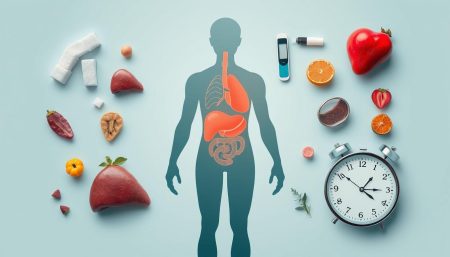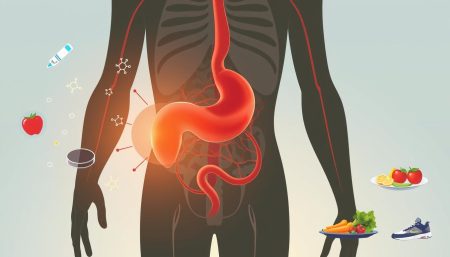Welcome to your health guide on diabetes mellitus, a common chronic disease affecting millions worldwide. We aim to answer the key question, “What is diabetes mellitus?” and give you a solid understanding of it. This will help you see its effects and manage it better.
On this journey through diabetes, you’ll learn about its types, symptoms, causes, and new treatments. But our guide goes further. It shows how lifestyle changes, education, and support can improve life for those with diabetes.
If you’re affected by diabetes, know someone who is, or just want to learn more, this guide is for you. We aim to clear up the mysteries of diabetes. From its science to daily care, we’ll help you towards better health and wellbeing.
What Is Diabetes Mellitus?
Diabetes mellitus is a group of metabolic conditions with high blood glucose levels. These levels are caused by problems with insulin function and blood sugar regulation. Knowing the diabetes definition helps us see how it affects the body’s energy use from food.
The Fundamental Overview
Diabetes happens when the pancreas doesn’t make enough insulin or can’t use it well. Insulin is key for glucose to enter cells for energy. Without it, glucose stays in the blood, leading to diabetes.
The Role of Insulin in Blood Sugar Regulation
Insulin and blood sugar levels work together to keep the body balanced. Without insulin function, glucose stays in the blood, causing high levels. This can lead to serious health problems, showing why blood sugar regulation is so important.
So, understanding diabetes definition and insulin’s role is more than just medical treatment. It’s about helping people live healthier by making smart health choices and habits.
Exploring the Different Types of Diabetes
Diabetes is a complex condition with several types. Each type has its own causes, symptoms, and treatment needs. Knowing the differences between Type 1 diabetes, Type 2 diabetes, and gestational diabetes is key for proper diagnosis and care.
- Type 1 diabetes usually starts in children or teens. It’s also called juvenile diabetes. This happens when the body attacks the cells that make insulin in the pancreas.
- Type 2 diabetes is more common and often starts in adults over 45. But it’s becoming more common in younger people due to lifestyle choices. It’s when the body can’t use insulin well.
- Gestational diabetes happens during pregnancy. It can be risky for both the mother and the baby. It may also increase the chance of getting Type 2 diabetes later.
Each type of diabetes needs its own approach to management. Finding and treating it early can greatly improve life quality for those affected.
| Diabetes Type | Common Onset | Risk Factors |
|---|---|---|
| Type 1 diabetes | Childhood/Adolescence | Genetics, Autoimmune |
| Type 2 diabetes | Adults (45 years and older) | Obesity, Lifestyle, Age |
| Gestational diabetes | Pregnancy | Pregnancy, Genetics, Lifestyle |
Understanding types of diabetes is vital for managing health and outcomes.
Recognizing the Symptoms of Diabetes
Diabetes is a big health problem worldwide. Knowing the early signs of diabetes can help manage it better. This is true for both kids and adults with diabetes.
Common Indicators to Watch For
- Increased thirst and frequent urination
- Extreme fatigue
- Blurred vision
- Unexpected weight loss
- Slow healing sores or frequent infections
These signs are important for spotting diabetes early. Finding diabetes early helps manage it better. It also reduces health problems linked to it.
Understanding the Symptoms in Different Age Groups
Diabetes symptoms can differ in kids and adults. Kids might show signs like weight loss or tiredness quickly. Adults might notice symptoms slowly over time.
Regular health checks are key, mainly for those at risk. They help catch diabetes early. This is important for both kids and adults with diabetes.
The Causes and Risk Factors of Diabetes Mellitus
Understanding the causes of diabetes and knowing the diabetes risk factors is key. This knowledge helps in early detection and prevention. Different factors can trigger diabetes in different people.
Genetic predisposition plays a big role in type 1 diabetes. If your family has diabetes, you’re more likely to get it. This shows how important genetics are.
- Lifestyle choices like diet and exercise.
- Being overweight, mainly around the middle.
- Getting older, as risk goes up.
- High blood pressure and cholesterol.
- Being from certain ethnic groups, like African American, Hispanic, and Native American, increases risk.
Each risk factor on its own can increase diabetes risk. But when they work together, the risk goes up even more.
| Risk Factor | Detail | Impact Level |
|---|---|---|
| Genetic Disposition | Family history of diabetes | High |
| Obesity | Body Mass Index over 30 | High |
| Age | Above 45 years | Medium |
| Ethnicity | African American, Hispanic, and Native American descent | Medium |
| Lifestyle | Poor diet and physical inactivity | High |
Knowing about diabetes risk factors helps in managing health better. It can help prevent or delay diabetes. If you have a genetic predisposition, it’s important to make healthy choices.
Diabetes Diagnostics: Getting a Proper Diagnosis
Getting a correct diabetes diagnosis is key for managing the disease well. Tests like blood glucose testing and the A1C test are essential for this.
Blood glucose testing is the first step to check for diabetes. It shows your blood sugar levels at that moment. To get a precise diagnosis, your fasting blood glucose is checked after not eating overnight.
The A1C test shows your blood sugar levels over a longer time—usually two to three months. It helps see how well your diabetes is being managed by showing your average blood glucose levels.
Regular testing is vital. People with diabetes should have an A1C test at least twice a year. If treatment goals aren’t met or if treatment changes, they might need more tests. Those suspected of diabetes might have to do several blood glucose tests to confirm it.
Here’s a quick look at how these tests compare:
| Test Type | What It Measures | Frequency Recommended |
|---|---|---|
| Blood Glucose Testing | Blood sugar levels at the time of the test | Initially for diagnosis; regularly for monitoring |
| A1C Test | Average blood sugar over two to three months | Twice a year, or more often if needed |
Understanding these tests is critical for managing diabetes. Whether you’ve had diabetes for a long time or just got diagnosed, knowing and regularly doing these tests is essential.
Managing Diabetes on a Daily Basis
Managing diabetes well means having good daily habits and making long-term health plans. We’ll look at key parts of a diabetes management plan. This includes eating right, staying active, and making lifestyle changes for better health.
Maintaining a Balanced Diet
A healthy diet is key for managing diabetes and staying well. It’s important to balance carbs, proteins, and fats to avoid blood sugar highs. Here’s an example of a balanced diet:
- Breakfast: Oatmeal with berries and Greek yogurt
- Lunch: Grilled chicken salad with leafy greens and vinaigrette
- Dinner: Steamed fish, quinoa, and steamed veggies
- Snacks: Almonds or carrots with hummus
Importance of Exercise and Lifestyle
Exercise is vital for diabetics. It makes the body more responsive to insulin, helping control blood sugar. It’s best to mix aerobic exercises with strength training. Here are some good exercises for diabetics:
- Aerobic exercises like brisk walking, swimming, or cycling
- Resistance training with weights or bands
Making lifestyle changes is also important for managing diabetes. Reducing stress and getting enough sleep can help control blood sugar and improve health.
Long-term Complications and Risks of Diabetes
It’s important to know the long-term risks of diabetes. This is true for both patients and their doctors. Diabetes complications can affect many parts of the body. So, managing the disease well is key.
Big health threats for people with diabetes include cardiovascular disease, neuropathy, and diabetic retinopathy. These issues can make life harder and lead to more health problems.
- Cardiovascular Disease: Diabetes increases the risk of heart problems like heart attacks and strokes.
- Neuropathy: High blood sugar can damage nerves, causing pain and numbness, often in hands and feet.
- Diabetic Retinopathy: Poor blood sugar control can harm the retina, possibly causing blindness.
To lower these risks, managing diabetes well is vital. This means keeping blood sugar levels in check and living a healthy lifestyle. Here’s how managing diabetes can affect these health issues:
| Complication | Risk Without Management | Risk With Management |
|---|---|---|
| Cardiovascular Disease | High | Medium to Low |
| Neuropathy | Very Likely | Possibly Reduced |
| Diabetic Retinopathy | High Likelihood of Severe Damage | Reduced Severity and Progression |
Advancements in Diabetes Treatment Options
The world of diabetes care is changing fast, with new diabetes treatment options emerging. These options focus on blood sugar medications and diabetes technology. They aim to make managing diabetes easier and less painful for patients.
Medications for Controlling Blood Sugar
New blood sugar medications are making it easier to control glucose levels. Big pharmaceutical companies have created drugs that work better and have fewer side effects. This makes life easier and helps keep people healthy.
Innovative Technologies and Future Prospects
The field of diabetes technology is growing fast. Devices like continuous glucose monitors (CGMs) and insulin pumps are making managing blood sugar easier. Soon, these devices will work even better with mobile apps, giving patients and doctors real-time updates.
With these new diabetes treatment options, the future of diabetes care looks brighter. The mix of medicine and technology is not just helping manage the disease. It’s also making life better for those living with diabetes.
Insights into Diabetes Prevention Strategies
Preventing diabetes starts with understanding how lifestyle choices affect our health. It’s important to know how diabetes prevention and reducing diabetes risk work. This involves adopting healthier living habits through various lifestyle interventions.
Studies show that making lifestyle changes can lower diabetes risk. These lifestyle interventions are key in managing and preventing diabetes. Eating right, staying active, and keeping a healthy weight are essential.
- Balanced diet with reduced sugar and processed foods
- Regular exercise, approximately 150 minutes of moderate activity per week
- Maintaining a healthy weight and body mass index
- Regular monitoring and screening for pre-diabetic conditions
Learning about the link between diabetes and hair loss shows the importance of managing health. It highlights the need for a holistic approach to health.
| Intervention | Effectiveness | Recommended Frequency |
|---|---|---|
| Dietary Changes | High | Daily |
| Physical Activity | High | 3-5 times a week |
| Weight Management | Medium to High | Regular Monitoring |
In summary, a lifestyle rich in physical activity, nutritious food, and preventive care helps prevent diabetes. This approach not only lowers diabetes risk but also boosts overall health.
Lifestyle Adjustments for Living with Diabetes
Managing diabetes requires big changes in how we live. These changes can greatly improve our daily life and health over time. By eating right and staying active, people with diabetes can control their symptoms and live better.
We will look at important diet tips and exercise plans. These are key for managing diabetes well.
The Impact of Diet in Diabetes Management
Watching what we eat is very important for diabetes control. Knowing how food affects our blood sugar helps us make healthy choices. A balanced diet with lots of nutrients, less bad fats, and some carbs is best.
- Whole grains like oats and quinoa
- Leafy greens such as spinach and kale
- Proteins like beans, lentils, and lean meats
- Healthy fats from avocados, nuts, and seeds
Eating these foods helps keep blood sugar stable. It also keeps our body healthy and lowers diabetes risks.
Exercise Regimens That Benefit Diabetics
Doing exercises that are good for diabetes is also key. Regular activity makes our body use insulin better and helps control weight. This helps keep blood sugar in check.
| Exercise Type | Benefits | Frequency |
|---|---|---|
| Brisk Walking | Improves cardiovascular health, enhances insulin sensitivity | 30 min/day |
| Swimming | Low impact, good for joint health, fun. | 20-30 min, 3 times/week |
| Strength Training | Bolsters muscle mass, burns glucose more efficiently | 20-30 min, 2 times/week |
| Yoga | Reduces stress, improves flexibility and glucose metabolism. | 30-40 min, 3 times/week |
These exercises are great for people with diabetes. They are designed for different fitness levels and interests. So, everyone can find something that fits their lifestyle and health.

Importance of Patient Education in Diabetes Care
what is diabetes mellitus Managing diabetes well depends a lot on diabetes patient education. Teaching people a lot about diabetes knowledge helps them take better care of themselves. This includes learning about food, checking blood sugar, and understanding what the numbers mean.
Learning programs make people more confident in handling their diabetes. They also lower the chance of serious problems. This way, patients know a lot about their health and how things can change it.
- Learning to be independent with self-management education is key. It includes counting carbs, using insulin, and knowing when blood sugar is low.
- Learning more about diabetes leads to better health results. Sessions help build a strong base of diabetes knowledge.
- Knowing more about diabetes improves life quality. It helps people feel in control, reducing worry and depression related to diabetes.
Knowing more about diabetes knowledge leads to better health habits. When people understand diabetes, they make smarter choices. This keeps blood sugar stable and cuts down on hospital visits. Staying up-to-date with new research and technology is key. It shows how important diabetes patient education is for life.
Navigating through the Challenges of Diabetes Mellitus
what is diabetes mellitus Living with diabetes comes with many challenges. Finding effective ways to cope is key to managing the disease. This section will look at practical solutions to help you face these challenges.
- Emotional resilience: Diabetes affects not just your body but also your mind. Activities like mindfulness, meditation, or therapy can help a lot.
- Healthcare navigation: Getting around the healthcare system can be tough. Having a good relationship with your doctors and a clear plan can make it easier.
- Long-term management: Keeping track of your diabetes and adjusting your plan is vital. It helps prevent serious problems and keeps you healthy.
Dealing with diabetes is not just about the physical side. It’s also about your emotional and mental health. Working with your healthcare team, joining support groups, and learning about new treatments are important.
| Challenge | Coping Strategy | Expected Outcome |
|---|---|---|
| Daily glucose monitoring | Use of digital tracking tools | Improved glucose level management |
| Diet Management | Consultation with a dietician | Balanced blood sugar levels |
| Exercise Routine | Regular physical activity adapted to ability | Enhanced overall health |
| Emotional Stress | Regular mental health support | Better emotional resilience |
Understanding Insurance and Costs Related to Diabetes Care
what is diabetes mellitus Managing diabetes means more than just health checks and lifestyle changes. It also involves dealing with the financial side. The costs include daily supplies, medicines, doctor visits, and treatments for complications. Knowing about diabetes insurance coverage is key for those with diabetes.
Diabetes Care Costs can add up fast, from regular health checks to emergency care. Here’s a breakdown of typical expenses and how insurance can help.
| Coverage Type | Annual Policy Limit | % Covered | Typical Out-of-Pocket Expense |
|---|---|---|---|
| Basic Health Insurance | $5,000 | 70% | $1,500 |
| Comprehensive Diabetes Plan | Unlimited | 90% | $300 |
| High-Deductible Plan | $10,000 | 50% | $5,000 |
To handle healthcare expenses well, patients should look at different insurance plans. They should compare costs, coverage, and services like doctor visits and diet advice. This helps find the best plan for managing diabetes.
- Check your healthcare plan every year to see if it’s right for you.
- Consider extra insurance if your current plan doesn’t cover enough.
- Look for help from programs or non-profits to lower diabetes care costs.
It’s not just about finding insurance that covers a lot of costs. It’s also about getting the medical help and support you need. Good coverage lets patients focus on managing their diabetes without worrying about huge bills.
Support Networks and Resources for Diabetics
what is diabetes mellitus Managing diabetes is more than just medical treatment. It needs a strong support system. This includes diabetes support networks and diabetes resources. This section looks at key platforms and communities that offer emotional and practical help to those with diabetes.
Community Support: Having a strong community support can greatly help with diabetes management. Many health centers and local groups offer support groups, educational workshops, and social events. These help people feel less alone in their diabetes journey.
- Online Forums: Online platforms let diabetics share experiences, tips, and encouragement.
- Local Meetups: Regular meetups help people connect and share advice on managing diabetes.
- Workshops & Seminars: Educational sessions keep people updated on the latest diabetes management practices.
Diabetes support networks and community support work together to improve lives. These networks offer a place for emotional expression and are key educational resources.
| Resource Type | Benefits | Access |
|---|---|---|
| Online Diabetes Forums | 24/7 peer support, sharing personal experiences, accessible from anywhere | Open Access |
| Local Health Workshops | Direct interaction with healthcare professionals, tailored health education | Community Health Centers |
| National Diabetes Associations | Comprehensive diabetes resources, latest research, policy advocacy | Membership |
Using these diabetes support networks and accessing different diabetes resources can improve disease understanding and management. It can also lead to a better quality of life for those with diabetes.
Breaking Down Myths vs. Facts About Diabetes
what is diabetes mellitus In our final section, we tackle the confusion around diabetes. Many diabetes myths spread, making it hard to make good choices and manage the disease well. We aim to clear up these myths and stick to what science says.
One myth is that diabetes only hits those who are overweight or obese. But this is too simple. Type 1 diabetes is an autoimmune issue, not caused by lifestyle or weight. Type 2 diabetes is linked to weight and lifestyle, but it’s not just for the overweight. Genetics and other factors also matter.
Another myth is that eating too much sugar causes diabetes. While diet is important, sugar alone isn’t the main problem. Diabetes comes from a mix of genetics, environment, and lifestyle. This article has shown the need to understand diabetes better. We hope to have helped clear up the confusion by debunking diabetes myths. By sharing accurate info, we help people prevent or manage diabetes, leading to better health.
FAQ
Q: What is diabetes mellitus?
A: Diabetes mellitus is a group of diseases. They are caused by high blood sugar levels. This happens because of problems with insulin production or action.
Q: How does insulin function in blood sugar regulation?
A: Insulin is a hormone made by the pancreas. It helps control blood sugar levels. It helps cells use glucose for energy and tells the liver to store extra glucose.
Q: What are the different types of diabetes?
A: There are several types of diabetes. Type 1 is when the body can’t make insulin. Type 2 is when the body can’t use insulin well. Gestational diabetes happens during pregnancy.
Q: What are common symptoms of diabetes?
A: Symptoms include frequent urination and thirst. You might also lose weight, feel tired, have blurred vision, and wounds that don’t heal.
Q: Can children and teenagers develop diabetes?
A: Yes, kids and teens can get Type 1 and Type 2 diabetes. Symptoms are similar to adults but can include irritability and stomach pain.
Q: What are the causes and risk factors for developing diabetes?
A: The exact causes of diabetes are not known. But risk factors include genetics, obesity, and a sedentary lifestyle. High blood pressure and bad cholesterol levels also increase risk.
Q: How is diabetes diagnosed?
A: Doctors use blood tests to diagnose diabetes. These include fasting blood sugar tests, A1C tests, and oral glucose tolerance tests.
Q: What dietary changes can help manage diabetes?
A: Eating a balanced diet helps manage diabetes. It should include many nutrients but less sugar and carbs.
Q: How important is exercise for people with diabetes?
A: Exercise is very important for diabetics. It helps control blood sugar, improves insulin use, and lowers heart disease risk.
Q: What are some long-term complications of diabetes?
A: Long-term complications include heart disease, nerve damage, kidney damage, eye damage, and foot damage. These can lead to amputation.
Q: What treatment options are available for diabetes?
A: Treatments include lifestyle changes, blood sugar monitoring, insulin, oral meds, and new therapies like GLP-1 receptor agonists and SGLT2 inhibitors.
Q: Can diabetes be prevented?
A: Type 2 diabetes can often be prevented or delayed. This can be done through healthy lifestyle choices like a healthy weight, exercise, and a balanced diet.
Q: Why is patient education important in diabetes care?
A: Education is key. It helps people understand and manage their diabetes. It also helps them make informed health care decisions.
Q: What challenges do people with diabetes face?
A: People with diabetes face many challenges. These include keeping blood sugar levels stable, managing complications, and dealing with emotional stress.
Q: How can healthcare costs for diabetes be managed?
A: Costs can be managed by understanding insurance, using community resources, and talking to healthcare providers about affordable treatments.
Q: Are there support networks for people with diabetes?
A: Yes, there are many support networks. These include local groups, online forums, and organizations like the American Diabetes Association.
Q: What are some common myths about diabetes?
A: Common myths include thinking diabetes is not serious, that eating too much sugar causes it, and that diabetics can’t eat sweets. These are all false and highlight the need for better education.


















